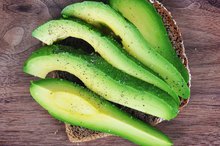Does Peanut Butter Interact With Warfarin?
Many foods interact with the anticoagulant warfarin, but peanut butter isn’t one of them. Foods with moderate or high vitamin K content can potentially decrease warfarin’s effectiveness 3. Certain vegetables, cooking oils, fruits and nuts are high in vitamin K and must be consumed with care, but peanuts and peanut butter contain little vitamin K and pose no such dangers. Work with your doctor to come up with a safe diet plan to complement warfarin therapy.
Vitamin K and Warfarin
Dietary vitamin K facilitates blood clotting and can make warfarin less effective. Consistency is key; the goal isn’t to avoid vitamin K-containing foods, but to consume the same amount of vitamin K regularly. To maintain a steady response to warfarin, avoid abruptly increasing or decreasing high-K foods in your diet. Your doctor can recommend a target range for vitamin K consumption.
- Dietary vitamin K facilitates blood clotting and can make warfarin less effective.
- Consistency is key; the goal isn’t to avoid vitamin K-containing foods, but to consume the same amount of vitamin K regularly.
Nuts and Vitamin K
The Coumadin Diet
Learn More
The consensus among U.S. government sources is that peanut butter contains little or no vitamin K. Certain medical center patient guides may list peanut butter as a moderate source of vitamin K, but this is incorrect. Other nuts and nut butters, however, do provide appreciable amounts of vitamin K, especially pine nuts, cashews and hazelnuts. Almonds, Brazil nuts, macadamia nuts and walnuts contain little or no vitamin K.
High-K Foods
Foods with very high vitamin K content include kale, spinach, cooking greens, parsley and green onion. Pay attention to all vegetables, many of which contain moderate to high amounts of vitamin K. Margarine, olive oil and soybean oil are also rich in vitamin K. Among fruits, avocado, blackberries, blueberries, kiwifruit, prunes and figs have the most vitamin K. Multivitamins and nutritional supplement drinks may have added vitamin K -- check nutrition information labels before consuming them.
Other Interactions
Does Vitamin C Affect Coumadin?
Learn More
Though not high in vitamin K, mango fruit, cranberry juice, pomegranate juice, soy milk and chewing tobacco may also interfere with warfarin therapy through mechanisms that are not fully understood. Check with your doctor before consuming these foods. Many common medications are dangerous to take with warfarin, including aspirin, ibuprofen, acetaminophen, other blood thinners, thyroid hormones, antibiotics and antifungals. Inform your prescribing physician about the medications, supplements and herbs that you take before starting warfarin therapy.
- Though not high in vitamin K, mango fruit, cranberry juice, pomegranate juice, soy milk and chewing tobacco may also interfere with warfarin therapy through mechanisms that are not fully understood.
Related Articles
References
- Drugs.com: Warfarin and Alcohol / Food Interactions
- U.S. Department of Agriculture Nutrient Data Laboratory: Nutrient Data for 16398, Peanut Butter, Smooth Style, Without Salt
- Indiana Hemophilia and Thrombosis Center: Warfarin (Coumadin) Interactions with Food
- Coumadin (warfarin sodium) [package insert]. Princeton, New Jersey: Bristol-Myers Squibb, 20XX.
- Harter K, Levine M, Henderson SO. Anticoagulation drug therapy: a review. West J Emerg Med. 2015;16(1):11-7. DOI: 10.5811/westjem.2014.12.22933
- Patel S, Patel N. Warfarin. In: StatPearls [Internet]. Treasure Island (FL): StatPearls Publishing.
- Tideman PA, Tirimacco R, St John A, Roberts GW. How to manage warfarin therapy. Aust Prescr. 2015;38(2):44-8. DOI: 10.18773/austprescr.2015.016
Writer Bio
Cindy Pineo has been writing about diet, wellness and culture since 2002. She is coauthor of the book "The Atkins Diet and Philosophy." Pineo holds a Master of Arts in English literature from the University of Illinois at Urbana-Champaign and a Master of Arts in humanities from the University of Chicago.









